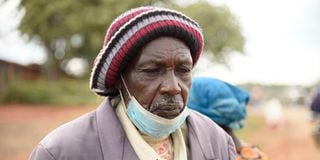Premium
Solai dam victims’ hope for justice fading away

Mr Lorok Lomoi speaks to journalists at Solai-Nyakinyua in Subukia, Nakuru County on May 7.He is among the victims of the 2018 Solai dam tragedy.
Life in Solai-Nyakinyua in Subukia Sub-county, just like any small trading centre, moves in fits and starts.
It’s the quintessential backwater; intermittent drones of boda boda taxis, the exchange of money and goods at the market and the occasional vehicle cruising past on the newly tarmacked Bahati-Solai-Subukia road.
However, beneath this facade of normality lies a wound whose pain is shared by almost every member of the small society. They all suffer painful memories of a horrific disaster that befell the community three years ago and which led to the death of 48 people, displacement of hundreds of families and destruction of property worth millions of shillings. It is the infamous Solai dam tragedy that occurred on May 9, 2018 when Patel Dam broke its banks and let its waters flow downstream, sweeping across three villages — Energy, Solai and Nyakinya.
Normal life was disrupted and the aftermath of the tragedy created friction between residents and the dam owner, Mr Patel Mansukh, after they differed on how to handle the tragedy.
In a bid to push for justice, civil and criminal cases were filed in the courts. Violent demonstrations also rocked the area as the victims protested what they claimed to be unfair actions from the police and administrators in handling their affairs.
Compensation
Three years down the line, little has been achieved in terms of compensation and restoration of victims’ lives. Mr Joseph Gathogo, after losing four children in the tragedy, says he’s ready to move on with his life provided he is compensated.
A bodaboda operator, Mr Gathogo, narrated how life has been tough for him and his family over the past three years.
“I’d built a semi-permanent house where I lived with my wife and four children. The tragedy took away everything I’d worked for and loved and left me with nothing,” he said.
He narrowly escaped death by climbing a tree. He saw his house and children being swept by the waters. His wife was rescued. A house built for him by the local church and the Kenya Red cross still stands unoccupied on his bare quarter-acre plot in Nyakinyua village.
“My wife could not stand living in this house as it gives her nightmares, so we went to live in my father’s compound,” Mr Gathogo said
Start life afresh
Determined to start life afresh, Mr Gathogo rented a motorbike to sustain his family. The couple has since been blessed with a child.
“Let the government work with Mr Patel on ways to compensate us so that we can move on with our lives,” he said.
Mr John Maina Mwangi, a retired teacher, lost his wife. He has been in and out of court fighting for compensation, but his hopes for justice are fast fading away.
“I’m almost giving up. I’m getting old. We’ve tried reaching out to Mr Patel for an out-of-court settlement, but our efforts have been unsuccessful,” he said.
Ms Veronica Wanjiku, 71, who lost her home, is eking out a living from farming on a small patch of her land that is still fertile as the rest is rocky. The raging waters dug huge gullies, which are widening and almost claiming the house that Kenya Red Cross built for her.
Fairness
“What I want is to be given my benefits after working for Mr Patel for close to 30 years. I also want my farm rehabilitated,” she says.
Kabazi MCA Peter Mbae noted that the victims are ready to settle the matter out of court and has urged the company to take the first action by formally making an application in court.
“All that the over 400 victims want is fairness, justice and compensation,” Dr Mbae said
Tindress Patel Coffee Estates farm manager Vinoj Kumar also expressed the company’s willingness to have the matter concluded. He blames human rights groups for complicating matters.
“We’d be so glad to have the matter out of court, but our hands are tied. There are so many organisations that have sued us claiming to act for different victims,” Mr Kumar said.
The company had done all it could to help the community, he said, especially during the Covid-19 pandemic.
Mr Kumar revealed that the company hired more than 1,000 area residents during the pandemic so as to offer them a means of livelihood.





